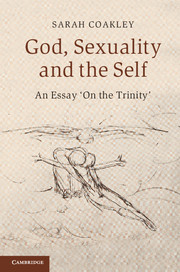Book contents
- Frontmatter
- Contents
- Illustrations
- Preface and acknowledgements
- Abbreviations
- Prelude: the arguments of this book
- Chapter 1 Recasting ‘systematic theology’: gender, desire, and théologie totale
- Chapter 2 Doing theology ‘on Wigan Pier’: why feminism and the social sciences matter to theology
- Chapter 3 Praying the Trinity: a neglected patristic tradition
- Chapter 4 The charismatic constituency: embarrassment or riches?
- Chapter 5 Seeing God: trinitarian thought through iconography
- Chapter 6 ‘Batter My Heart’: reorientations of classic trinitarian thought
- Chapter 7 The primacy of divine desire: God as Trinity and the ‘apophatic turn’
- Coda: conclusions and beyond
- Glossary of technical terms and names
- Scripture index
- General index
- References
Chapter 2 - Doing theology ‘on Wigan Pier’: why feminism and the social sciences matter to theology
Published online by Cambridge University Press: 05 June 2014
- Frontmatter
- Contents
- Illustrations
- Preface and acknowledgements
- Abbreviations
- Prelude: the arguments of this book
- Chapter 1 Recasting ‘systematic theology’: gender, desire, and théologie totale
- Chapter 2 Doing theology ‘on Wigan Pier’: why feminism and the social sciences matter to theology
- Chapter 3 Praying the Trinity: a neglected patristic tradition
- Chapter 4 The charismatic constituency: embarrassment or riches?
- Chapter 5 Seeing God: trinitarian thought through iconography
- Chapter 6 ‘Batter My Heart’: reorientations of classic trinitarian thought
- Chapter 7 The primacy of divine desire: God as Trinity and the ‘apophatic turn’
- Coda: conclusions and beyond
- Glossary of technical terms and names
- Scripture index
- General index
- References
Summary
In the last chapter I argued that current resistances to systematic theology can be answered precisely by acknowledging the force of their critiques – and then subtly shifting the vision of the systematic undertaking to enable a simultaneous response and rebuttal. The danger of a false reification of the divine, the danger of a false bid for totalizing power, the danger of a false suppression of material associated with the ‘unconscious’, gender, and desire: all these are real dangers for contemporary systematic theology, I conceded, and not ones that can be dealt with either by evasion or denial. But a theology founded in intentional practices of ‘un-mastery’, I claimed, is able to meet them precisely by its learned, and embodied, strategies of dispossession to the divine. And not only that; for as I now begin to work with the full set of methodological tools of a théologie totale, I can show that the root problem of fallen human desire is displayed in each of these notable contemporary criticisms of systematic theology, and can thus only be addressed by a transformative, indeed ascetical, approach to the theological task itself. Such a theology is indeed in via (as I put it in the Prelude): it is challenged to examine, and chasten, its own desires, and to draw all dimensions of the self transformatively into that quest.
The same tangled root of desire, I argued, underlies the current cultural fixations and debates on gender, exposing problems which finally can only adequately be addressed theologically, and by specific recourse to reflection on a trinitarian God. It is the ‘interruptive’, or purgative, work of the Holy Spirit, I claimed, drawing the believer progressively into the life of crucified and resurrected ‘Sonship’, that gives the key to gender’s ultimate rootedness in divine desire. In short, from the perspective of a théologie totale, desire, asceticism, and God as Trinity belong together, all the way down.
- Type
- Chapter
- Information
- God, Sexuality, and the SelfAn Essay 'On the Trinity', pp. 66 - 99Publisher: Cambridge University PressPrint publication year: 2013



